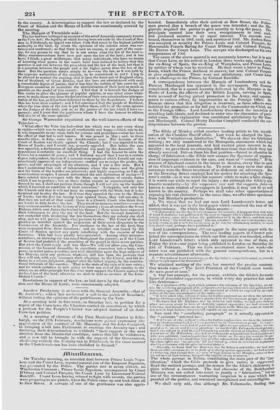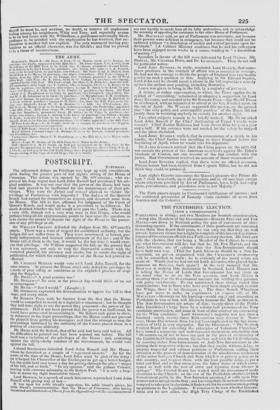The Globe of Monday added another leading article to his
mystifi.
cation of the Cheshire Sheriff affair. Last wed's( he charged the Spec. tato?. with " mischievous fabrication." We showed that we fabricated nothing ; we only transferred to the Metropolis, statements which bad appeared in the local journals, and had excited great interest in the locality : we gave them no colouring different from that which they bad already received. Driven from his first position—forced to abandon his charge of fabrication—the Globe now accuses the Spectator of suppres- sion of important evidence in the case, and want of " veracity." If the essence of falsehood consist in the intent to deceive, every line in each
of the Globe's articles contains a lie. To some it may scent that silent contempt were the fittest treatment of so dishonest an adversary. But as the Downing Street employe had his motive for attackire. the Spec.
tutor's credit—as it was worth his masters' while to make a false charge, it is worth our while to repel the injury ; for although the Globe's sys- tematic mendacity—by the 'suppressio ten i and the suggestio
known to most readers of newspapers in London, it may not be se well known in the country. Perhaps we shall take other opportunities of exposing his real character : in the mean time, we offer three specimens from last Monday's production. 1. We stated that we had not seen Lord Lansdowne's letter, and
added, that it was not in the local paper which contained the rest of the correspondence. On which the Globe asserts- " Unfortunately for the Spc,t,,,,r's charaeler for veracity, it happens that thig letter of Lord Lansdowne was publidaed lum the local newspaper which emitain ea the rest phe corresp.,,tdenre. some (lass before the publication of it in the Glot,e. and that swot. 'rimed it from ' the local newspaper ' into our columns? Had our contemporary heel' as iuda,triuus in his seareh for exeulpat.iry as him scums fur criminaMry matter, he iota /ow found-and, perhaps, have published
Lord Lansdowne's letter did not appear in the same paper with the rest of the correspondence.. The two leading papers in Chester pub- lished the correspondence on which our first article was founded, without Lord Lansdowne's letter; which only appeared in one of them, on Friday the 21st—our paper being published in London on Saturday the 22d of February. This we have ascertained since last week—the letter was not published with the general correspondence, but in a separate advertisement afterwards.
a." The butter of Lord Lansdowne, as the Specf«lor is compelled to admit, answerstAe charge traught against the Goveramte."
We admitted nothing of the sort, hut asserted the precise contrary, Our words were—" The Lord President of the Council never touches the main point at issue." 3. Our last example, for the present, exhibits the Globe's favourite figure of fraiuldeat suppression, in which every-day practice has made him dexterous-
" As a specimen of the spirit which animates the columns of the Sjmem tater, we salt- jolt. the rot,elwiing paragraph olits ,inslijiration for !nixing Mbricated and published the ingoitatioo upon the y Cmtneii, the thisehooil or which we exposed by an min. within of the true circumstances of the entire ease
" If it lie :tsked why, without waiting lbr further explaneon, we drew the inferenCe that an electioneering trick kid been pructi,,ed hv the Government people, we reply-
" We knew that the Ministers live by tit:MI.1mi :null tricks; we had seen them au other oeca.ions resort tu feats of dexterity against opponents; we had roa,uns fur believiug, t hat though there are Mel) of high honour in the Mini:dry, some of them arc list melt of high human., but perfeetl capable uf :my ITS•111111USi."
Now read the " concluding paragraph" as it actually appeared in the " columns " referred to—
It' it he hy, without waitiag for further explanation, we drew the inrerence that an electioueerioe trick 11,i I o•en practised by the Government people. we reply-
.. that three wc, hs had el ,psea since. the :Whir liCeM7W notorma,, laf,re tee row minted ii, a We mill trait .14 iii e, planation: we saw that Mr. Tullemache (weld yet sent' that it was rofesed to Lord lIcarg Chat nanaley and the electors of CheNhire that it n'aS denied eren 5,, Mr. Withraltam; hf,! hod We 0/.411 el( fiMIIMMUM Lard Lanstteanea
letter was paldished, (and only pehii,ho( the 111ohe on Tnesde y this wed.. flit. the ph'
puse ,:fc,,nruting is,) we should hare Leen no better itybruged than Mr. Tollemaehe -iuwhein the whole. Vitir wan • inexplicattc' till last Raturd iy, when he received an explanatieu
diem variance with the api,e instreeltd Giotto's.
" Secondly, vie knew that the Mittisters lire by deltiiim and tricks; we had seen them 101 oilier occasions resart to finds elf dexterity against opponents; We bad reasons for belies Mg, that though there it.,, men of high honour in the Ministry, sonic °Mem are nut men of high honour, but perfectly capable of any meanness." The whole passage in Italics, constituting the main part of the "jus-
tification," which the Globe pretends to give entire, is suppressed. Read the omitted passage, and the reason for the Globe's dishonesty is plain without a comment. The bad character of the Bedchamber Ministry was not called into court to justify a " fabrication," but as one of the circumstances warranting suspicion in a case which had puzzled all the parties, and remained unexplained and unintelligible. We shall only add, that although Mr. Tollemache, finding that
Sheriff he must be, and anxious, no doubt, to remove all unpleasant feeling among his neighbours, Whig and Tory, and especially averse to be on bad terms with Mr. Wilbraham, a gentleman universally liked, professes to be satisfied with the explanation he has received, that ex- planation is neither full nor explicit. The only statement having pre- tensions to an official character, was the Globe's; and that we proved to be a tissue of incorrectness.



























 Previous page
Previous page